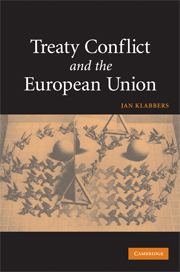Book contents
- Frontmatter
- Contents
- Preface
- Table of cases and official materials
- Table of treaties and instruments
- PART I Setting the scene
- PART II International law
- PART III EC law
- 6 The EC and anterior treaties
- 7 The UN Charter and the European Convention
- 8 Posterior treaties: conceptual issues
- 9 Posterior treaties: practice
- 10 Conclusions
- Bibliography
- Index
10 - Conclusions
Published online by Cambridge University Press: 03 February 2010
- Frontmatter
- Contents
- Preface
- Table of cases and official materials
- Table of treaties and instruments
- PART I Setting the scene
- PART II International law
- PART III EC law
- 6 The EC and anterior treaties
- 7 The UN Charter and the European Convention
- 8 Posterior treaties: conceptual issues
- 9 Posterior treaties: practice
- 10 Conclusions
- Bibliography
- Index
Summary
The first major conclusion to be drawn from this study is that the law of treaties has little to offer when it comes to solving the really difficult cases of treaty conflict. That should not come as a surprising conclusion: in their own way, other studies have made much the same point, culminating in the fairly generally accepted proposition that, at the end of the day, the principle of political decision applies: when confronted with conflicting treaty obligations, a state must simply pick and choose which one to honour, and compensate the party which loses out.
What this study offers, however, in relation to the principle of political decision, is two things. First, it suggests reasons why the law has to fall back on the principle of political decision: with every treaty being res inter alios acta, international law cannot, while remaining true to its horizontal nature, facilitate any choice; and with the Vienna Convention focusing on the treaty as instrument rather than as obligation, a choice based on substantive values (e.g., human rights treaties shall prevail over all other treaties) is also out of reach. Secondly, this study also makes the point that perhaps this is not something to despair at, but rather something to celebrate: the open-ended nature of the treaty conflict provisions of the Vienna Convention facilitates the search for a fair and just settlement in each and every individual case.
- Type
- Chapter
- Information
- Treaty Conflict and the European Union , pp. 227 - 231Publisher: Cambridge University PressPrint publication year: 2008



